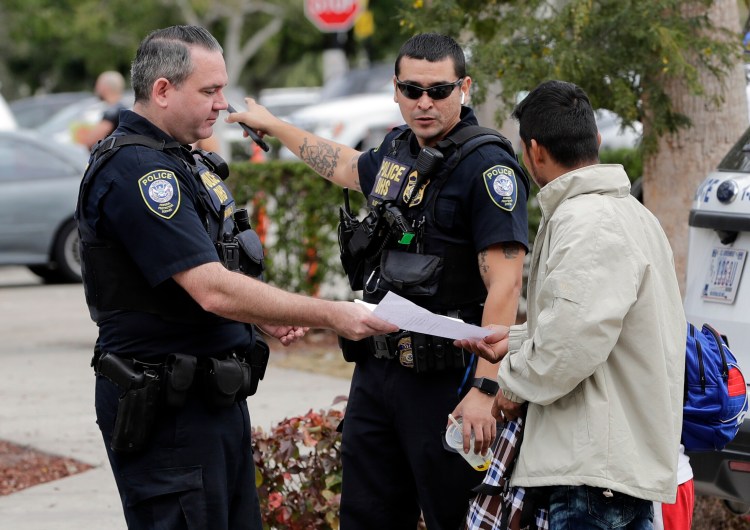AUGUSTA — The nation’s boisterous debate over immigration policy spilled into the Maine State House on Wednesday, as lawmakers took testimony on two bills that would set sharply contrasting policies for how local police work with federal immigration authorities.
The bills, sponsored by Rep. Craig Hickman, D-Winthrop, and Rep. Larry Lockman, R-Amherst, are political polar opposites.
Lockman’s bill takes aim at Portland and would push local police to work more closely with federal law enforcement, especially Immigration Customs Enforcement and other agencies in the Department of Homeland Security. The measure would prohibit municipal governments from restricting the sharing of immigration and citizenship information with federal agents.
Hickman’s bill would prohibit police in Maine from enforcing federal immigration law. It would expressly forbid police from “stopping, investigating, interrogating, arresting or detaining a person solely for immigration enforcement purposes …” without a federally issued warrant. The measure also would prohibit giving federal agents access to state inmates or inmate information and would not allow local governments to provide resources or staff to federal immigration enforcement agencies. It would also prevent jails and prisons in Maine from detaining suspects for the federal government in immigration cases.
“For me it is hard to understand why politicians in Portland would want to handcuff and muzzle their own police department,” Lockman said.
Lockman inaccurately called Portland a “sanctuary city.”
Supporters of the bill included Waterville Mayor Nick Isgro, also the vice chairman of the Maine Republican Party, and former state Rep. Heather Sirocki, a Scarborough Republican.
Sirocki said law enforcement has a duty and obligation to enforce both federal and state laws, including immigration laws.
She opposed Hickman’s bill, saying it would require police to violate their oath to uphold the state and federal constitutions.
But opponents to Lockman’s bill, including Lincoln County Sheriff Todd Brackett, said sheriffs can’t detain immigrants without the proper documentation from ICE.
“It is incumbent upon federal ICE agents to conduct due diligence before detaining these individuals, and not use our jails to hold people while they try to find reasons to support these decisions,” said Brackett, who testified on behalf of the Maine Sheriff’s Association.
Other opponents said Lockman’s bill is unnecessary, because no police agency in Maine has a policy that prohibits it from cooperating with federal authorities.
“While certain counties have limitations on complying with detainer requests from the Department of Homeland Security concerning incarcerated individuals, those counties are not failing to communicate or cooperate with DHS,” said Beth Stickney, an immigration attorney who testified for the Maine Business Immigration Coalition.
Other opponents to Lockman’s bill included the Maine Municipal Association and ACLU of Maine.
“This proposal is a thinly veiled attempt to coerce every county and municipality in Maine to expend maximal local resources to enforce federal immigration law,” said Oamshri Amarasingham, the advocacy director for the ACLU of Maine. Amarasingham said the bill “upsets the balance of powers between the federal and state governments that is protected by the Tenth Amendment.”
Hickman said his bill would ensure that Maine police will not become agents of the federal government without a federal warrant.
“Law enforcement officers follow the law,” Hickman said following the hearing.
In testimony to support his bill, Hickman, who is African-American, said that before he was elected to the Legislature he was regularly mistaken for an immigrant or a migrant worker when he moved to Maine simply because of his skin color.
He told the committee that Maine passed a law in 1855 saying that state authorities were not required to enforce the federal Fugitive Slave Act of 1850. His immigration bill, he said, was meant to clarify that law enforcement in Maine would not go beyond what they are required to do under federal law.
“No more, no less. We can do what we did in 1855 and we can say, ‘No, enough of all of that.’ ” Hickman said. “People are not criminals simply because they are immigrants or asylum seekers. That is a fact and this bill seeks to make that law.”
Send questions/comments to the editors.




Success. Please wait for the page to reload. If the page does not reload within 5 seconds, please refresh the page.
Enter your email and password to access comments.
Hi, to comment on stories you must . This profile is in addition to your subscription and website login.
Already have a commenting profile? .
Invalid username/password.
Please check your email to confirm and complete your registration.
Only subscribers are eligible to post comments. Please subscribe or login first for digital access. Here’s why.
Use the form below to reset your password. When you've submitted your account email, we will send an email with a reset code.